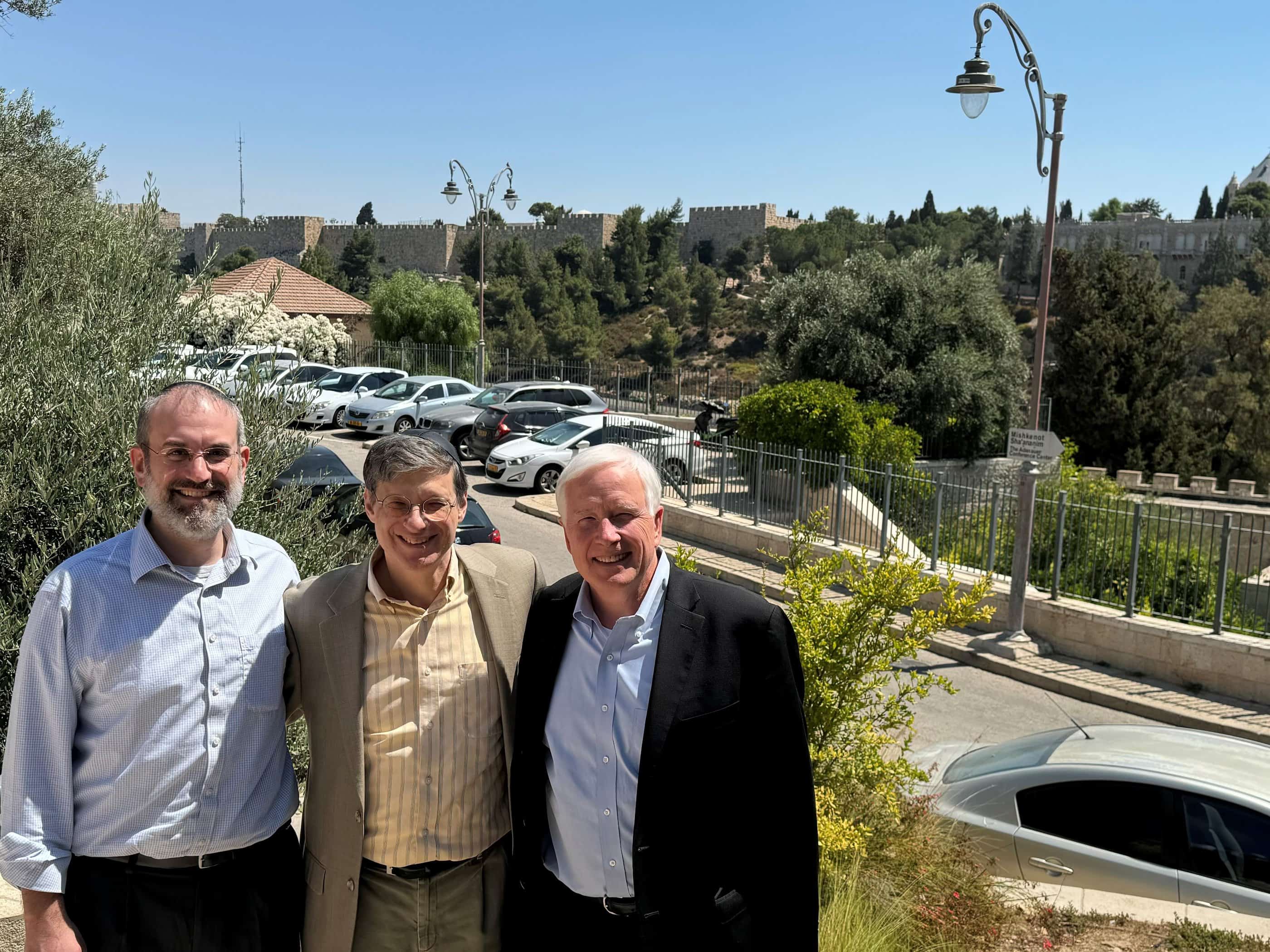
Friends have asked me why I am in Israel at a time like this, especially with heightened geopolitical challenges and the shadow war with Iran and its proxies getting more intense. What I have written here is a more detailed account of what I and some colleagues are doing in Jerusalem, which formed the basis of a CCU news release this week (see below), (written by our host Yoram Hazony (in the center of the above image, along with Rabbi Rafi Eis, and me), director of the Herzl Institute, with a comment by me at the end).
CCU News Release:
Colorado Christian University is Partnering with Herzl Institute this week in Jerusalem creating a Course in the Political Philosophy of the Bible
Israel is defending itself against its enemies, responding to the worst terror attack on Jews since the Holocaust. Meanwhile, anti-Israel and anti-Semitic movements are on the rise on many Western campuses. In these dark times, universities contribute to the illiteracy of the Jewish tradition and its importance to the Western nations. The Bible is not studied as a source of ideas on university campuses. While the Hebrew Bible is taught as a religious text in Christian institutions, no university offers an introductory course to the political teachings of the Hebrew Bible that can be studied alongside other political theories. And yet these ideas deeply influenced the Western world as well as the American founding fathers.
Taking a courageous stand at this precarious moment, CCU is partnering with the Herzl Institute in Jerusalem on a groundbreaking initiative to develop an introductory course in the political philosophy of the Hebrew Bible. Chancellor Donald W. Sweeting and two other CCU professors will join American and Israeli scholars to workshop this course in Jerusalem. The course will introduce students to the biblical narrative from Genesis to Kings and the political concepts that it teaches. Students will learn Hebraic political concepts such as monotheism and its implications, Abraham’s covenant, the shepherd nation’s stand against empire, the Biblical conception of the family, Israelite exodus from slavery, Mosaic rule of law and limited government, David’s just reign through repentance, and Solomon’s successful succession.
Yoram Hazony, president of the Herzl Institute in Jerusalem said, “In developing this course, CCU and THI are offering a way to reconstruct political philosophy, teaching students to appreciate the contribution of the Jewish people to Western political philosophy by introducing them to biblical concepts that enable them to recognize the challenges facing the family, the nation and the transmission of tradition.”
Donald Sweeting added, “In this unusual collaboration of evangelicals and orthodox Jews, we will be meeting in Jerusalem, at this very tense political moment, not only to stand in solidarity with our Jewish friends, but to do something constructive for our universities and the rising generation of students.”
This is a unique, and what I would even call a breakthrough conversation and collaboration between evangelicals and Orthodox Jewish scholars as we push back against not just the secularism, but the new ascendant Marxism, that has taken hold of too many American universities. It is a unique time of studying the Bible together. It is a moment to be bold for the Bible, promoting Biblical literacy and the political wisdom of the Bible to an increasingly radicalized generation of students. It is a critical time to stand together to promote and contend for our Judeo-Christian heritage in the midst of an on-going assault on Western civilization.
While the Jewish state is facing the prospect of a military battle for its existence, there is a battle of ideas taking place in our universities and we wanted to do something immediate and constructive about it together. More than that, I felt this is an opportunity to stand in solidarity with our Jewish friends in a moment when the world seems like it is turning against them.
We are all watching the explosive rise of antisemitism in American universities (among students and faculties and administrators), in the Democratic party, in the UN, and in so many cities. I felt it was an opportune time for an evangelical Christian university to step into the gap, take the lead, and say out loud, “this is not right.” I believe that at its deepest, antisemitism is a rebellion against, not just this or that action by the Jewish state, but ultimately it is a rebellion against the God of the Bible. And when that happens in a culture, the hatred and persecution against Jews is often followed by a similar hatred and persecution against Christians. Consequently, we will not and must not remain silent.
In his recent book The Magna Carta of Humanity, Os Guinness writes, “there is no more important alliance at this hour than between Jews and Christians, for the…Bible in the West is the key to the survival of the West.” He then quotes Rabbi Heschel who wrote after World War II and said that Jews and Christians “must realize that in our age anti-Semitism is anti-Christianity and that anti-Christianity is anti-Semitism.”
We will be involved in a very important conversation, working for an important outcome at an important moment in western and world history. That’s why we are here. We come praying for the peace of Jerusalem and, as the psalmist says, trusting in the one who is our refuge and strength and ever present help in trouble.

1 Comment
You traveling to Isreal a response to your calling. Traveling is a great way to learn culture and religion.
Safe travels.
Joy to the whole Entire world!
Pearl E. Gaither